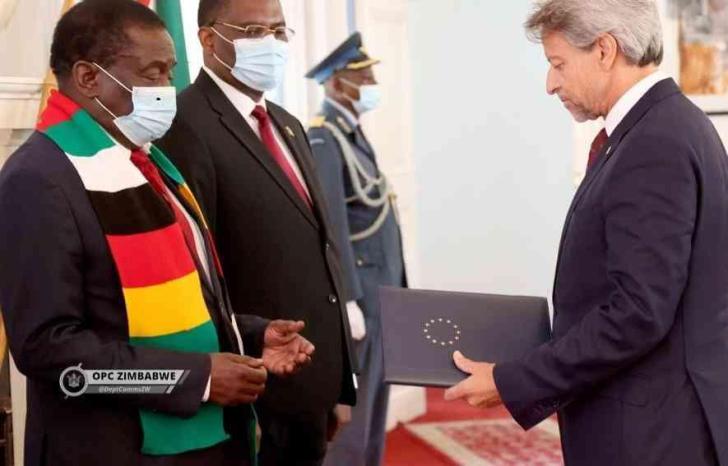News / National
EU to withdraw support for Zimbabwe's Arrears Clearance and Debt Resolution process?
10 Oct 2023 at 10:23hrs |
1408 Views

The European Union (EU) has delivered a significant blow by suggesting the possibility of withdrawing its support for Zimbabwe's Arrears Clearance and Debt Resolution process in light of the country's contested elections.
Recently, the EU withdrew the $5.8 million it had provided to the Zimbabwe Electoral Commission to facilitate the election process.
Back in February, African Development Bank President Akinwumi Adesina, who played a key role in the critical debt discussions alongside former Mozambican President Joaquim Chissano, emphasized the importance of free and fair elections in helping Zimbabwe address its debt challenges, compounded by long-standing defaults and associated penalties.
During these discussions, Western diplomats expressed their interest in assisting Zimbabwe with its mounting consolidated debt, amounting to $17.5 billion, as part of re-engagement efforts, provided that the country conducts free and fair elections.
Speaking to NewsDay, EU Ambassador to Zimbabwe, Jobst von Kirchmann, stated that the government has diverged from the agreed-upon course of action in the debt clearance negotiations. He explained, "The government has independently introduced indicators such as the Corruption Perception Index... Our objectives are set over the years. These objectives encompass free, fair, and inclusive elections, an expansion of civic space, electoral reforms, and more."
The government had presented at least 16 indicators to demonstrate its commitment to debt clearance.
Regarding the political signals observed, Kirchmann mentioned concerns about the recent elections and the Patriotic Act, which were not aligned with the agreed-upon process. Additionally, there has been a notable surge in defamation and disinformation campaigns.
Kirchmann highlighted that the EU's next step would involve presenting the final report in November, compiled by their Election Observer Mission (EOM). This report, part of an administrative agreement signed between the EU and the government, will influence future actions.
Responding to claims that the government never requested EU funding for the Zimbabwe Electoral Commission, Kirchmann clarified, "The government sought and consented to this support. It was not initiated by the EU but was a request from the government of Zimbabwe to receive assistance for the Zimbabwe Electoral Commission. Those circulating such claims appear to be attempting to undermine relations between Zimbabwe and the EU."
Furthermore, Kirchmann expressed concern that the disinformation and misinformation campaign against the Election Observer Mission has been extended to include the EU. He emphasized the EU's significant contributions to Zimbabwe, including a free trade agreement and a development portfolio exceeding 300 million euros, and refuted allegations of undermining Zimbabwe, labeling them as baseless and unsubstantiated attacks on the EU.
Recently, the EU withdrew the $5.8 million it had provided to the Zimbabwe Electoral Commission to facilitate the election process.
Back in February, African Development Bank President Akinwumi Adesina, who played a key role in the critical debt discussions alongside former Mozambican President Joaquim Chissano, emphasized the importance of free and fair elections in helping Zimbabwe address its debt challenges, compounded by long-standing defaults and associated penalties.
During these discussions, Western diplomats expressed their interest in assisting Zimbabwe with its mounting consolidated debt, amounting to $17.5 billion, as part of re-engagement efforts, provided that the country conducts free and fair elections.
Speaking to NewsDay, EU Ambassador to Zimbabwe, Jobst von Kirchmann, stated that the government has diverged from the agreed-upon course of action in the debt clearance negotiations. He explained, "The government has independently introduced indicators such as the Corruption Perception Index... Our objectives are set over the years. These objectives encompass free, fair, and inclusive elections, an expansion of civic space, electoral reforms, and more."
The government had presented at least 16 indicators to demonstrate its commitment to debt clearance.
Regarding the political signals observed, Kirchmann mentioned concerns about the recent elections and the Patriotic Act, which were not aligned with the agreed-upon process. Additionally, there has been a notable surge in defamation and disinformation campaigns.
Kirchmann highlighted that the EU's next step would involve presenting the final report in November, compiled by their Election Observer Mission (EOM). This report, part of an administrative agreement signed between the EU and the government, will influence future actions.
Responding to claims that the government never requested EU funding for the Zimbabwe Electoral Commission, Kirchmann clarified, "The government sought and consented to this support. It was not initiated by the EU but was a request from the government of Zimbabwe to receive assistance for the Zimbabwe Electoral Commission. Those circulating such claims appear to be attempting to undermine relations between Zimbabwe and the EU."
Furthermore, Kirchmann expressed concern that the disinformation and misinformation campaign against the Election Observer Mission has been extended to include the EU. He emphasized the EU's significant contributions to Zimbabwe, including a free trade agreement and a development portfolio exceeding 300 million euros, and refuted allegations of undermining Zimbabwe, labeling them as baseless and unsubstantiated attacks on the EU.
Source - newsday
Join the discussion
Loading comments…










































